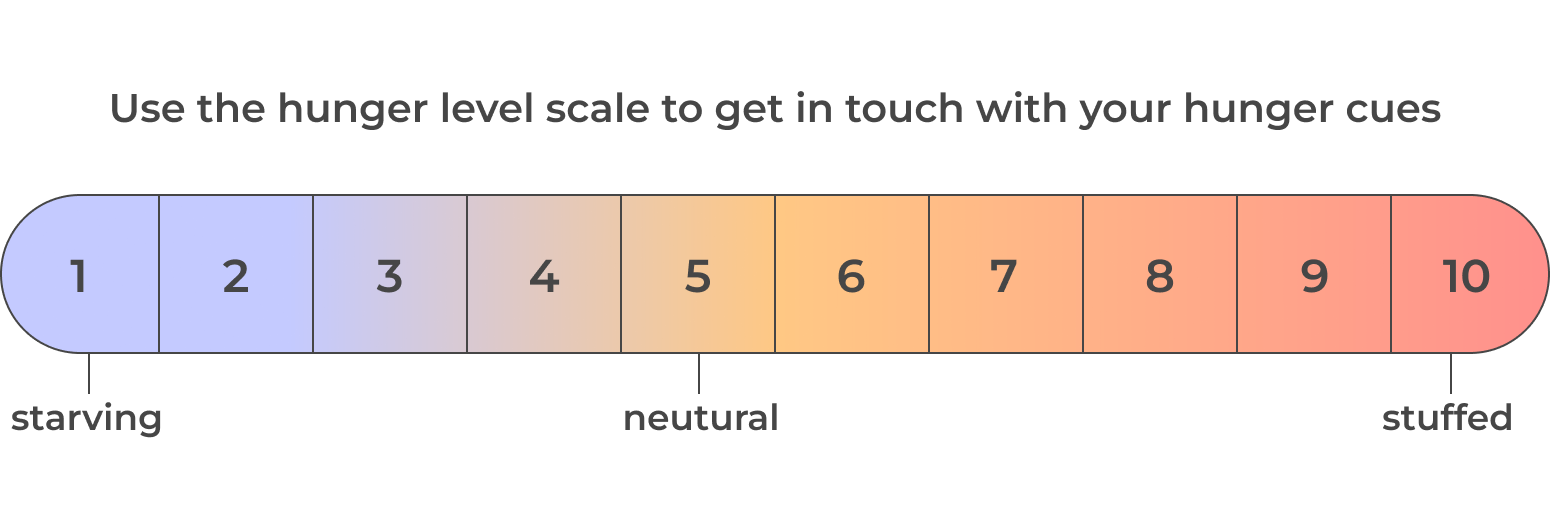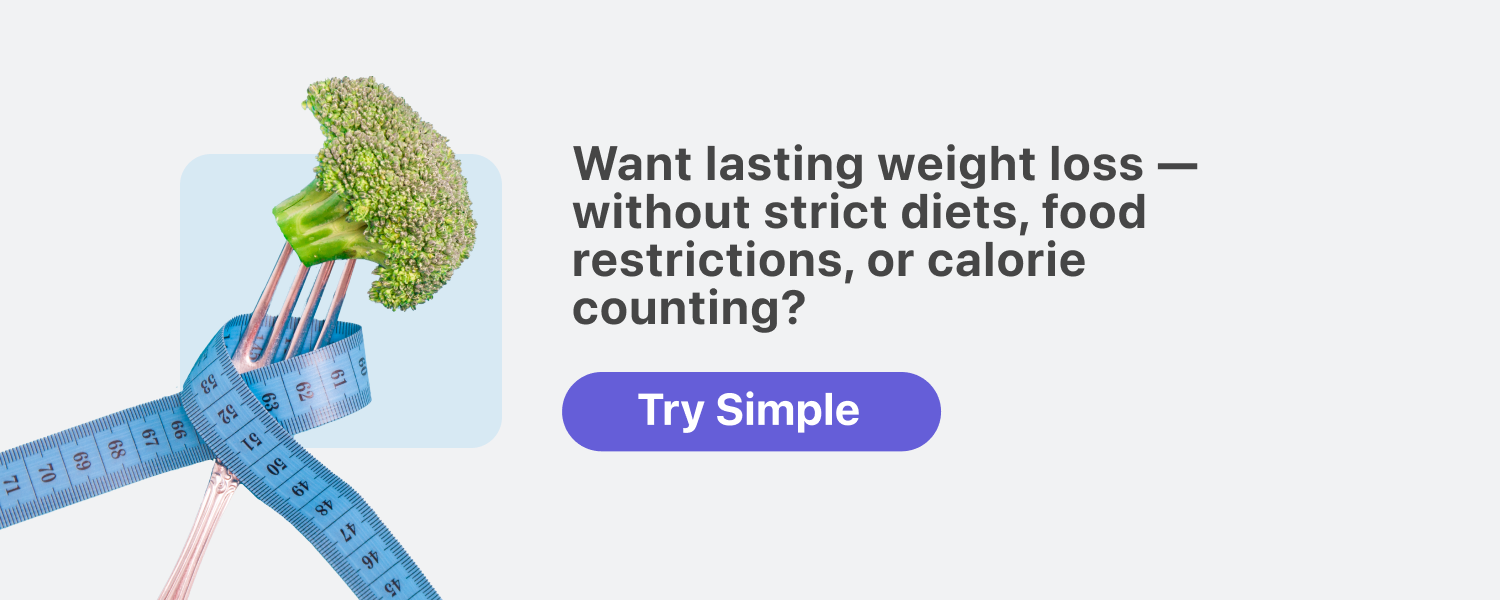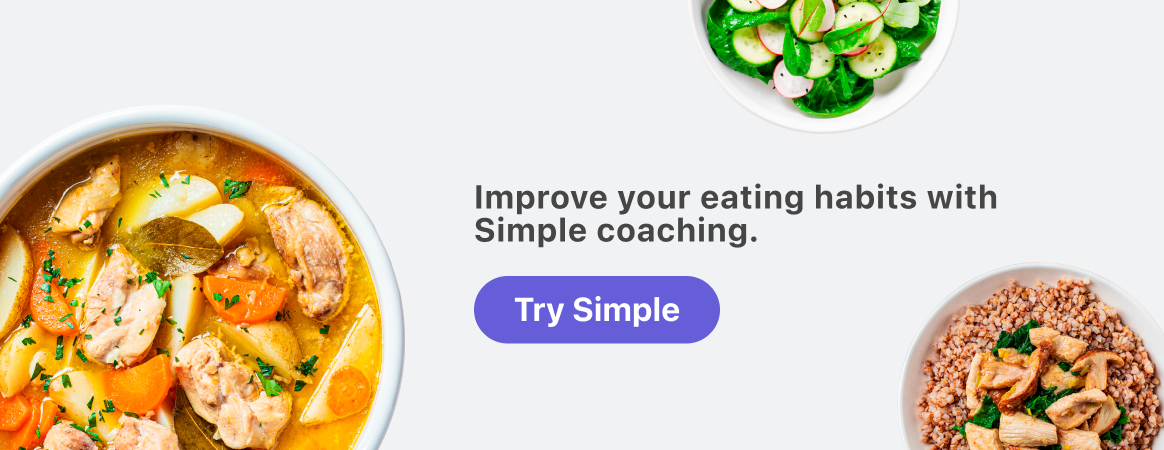How to not feel hungry when intermittent fasting

Particularly when you’re new to fasting, hunger can feel like a scary monster lurking in the shadows. Maybe it follows you everywhere; maybe it just jumps out at certain times.
However you feel hunger, it’s totally normal — anytime you change your eating schedule, it will take your body some time to adapt. Plus, everyone experiences fasting and hunger differently, so your hunger creep may look and feel differently than your friend’s, partner’s, or coworker’s.

While that means there isn’t one universal recipe for how not to feel hungry when fasting or how to curb hunger when fasting, there are lots of tricks and treats you can have ready in your arsenal anytime you need to keep the hunger hulk at bay.
From food hacks to life hacks, here’s everything you need to know about how to deal with hunger while fasting.
Hunger and intermittent fasting
How to ignore hunger when fasting is the golden question on everyone’s lips. Even if hunger sometimes feels like that shadow monster, your appetite serves a purpose. It keeps you alive by telling you when to eat.
Unfortunately, not all hunger signals are beneficial or an accurate reflection of true hunger. Sometimes, you feel hungry an hour or two after a large meal or experience a pang of “there’s always room for dessert” determination. Or you spot your favorite food across the room, and even though you absolutely weren’t hungry a second ago, the rest of the world melts away, and your stomach rumbles.
Most of us have never actually been in danger of starving, even if it totally feels like it when the store was out of the chocolate you were literally dying to have. These hunger pains (slash grumbles, sighs, or irritated shrieks) haven’t evolved to respond to the constant availability of food that modern life provides, and your brain hasn’t figured out the difference between true hunger and hunger that’s a response to that food availability.
So, how not to be hungry when fasting and how to stop feeling hungry when fasting comes down to learning new ways of responding to those hunger signals, from changing what you eat and drink to changing how you react to hunger flares and scare tactics.
Beyond our general tips below, we can also help you — as the one-of-a-kind individual you are — get past any hunger boobytraps and succeed in your fasting quest. Take our Simple quiz and unlock new levels of personalized information, from intro intermittent fasting for beginners advice to more nuanced guidance on things like “What breaks a fast?” and “Does intermittent fasting slow metabolism?”

What causes hunger?
Your body, brain, and gut are such good supporters of Team You that they don’t always work in harmony.[1] For example, our hungry vs. thirsty signals are so similar that our brain isn’t able to differentiate between them.
While hunger can feel like a nebulous concept, it’s actually a complicated system involving your hormones, physiology, and psychological response to food — and it’s all orchestrated by your gut-brain axis.[2]
Hunger starts in your gut. When your stomach, large, and small intestine empty after your last meal, the hunger hormone motilin is released.[3] When motilin enters your system, it triggers the hormone ghrelin,[3] which can be released when you anticipate mealtime, whether you’re full or not. It’s the expectation of food that makes you hungry, and it has nothing to do with the time of day or whether your digestive system actually needs more fuel.
This drive to eat even without an energy deficit is called “hedonic hunger,” and it isn’t well understood by science. But it’s likely related to the reward system in your brain, which interferes with your perception of feeling full.[4] (Cue the memory montage of the times you cried over ice cream pints post break-up or happily munched on chips throughout a big game.)
You experience hunger on both physiological and psychological levels. Thankfully, there are effective ways to curb both during your fast.

8 food hacks to help you reduce hunger while fasting
How to make yourself feel full when fasting starts with taking proactive steps to prevent hunger from rising up in the first place.
1. Eat more protein
One of the best hacks for how to stop hunger pangs when fasting involves getting enough protein in your daily meals. Protein is satiating,[5] so it helps you feel full, and it’s packed with hormones that tell your body and brain that you’ve had enough.[6] Lean proteins like chicken, chickpeas, pork, beans, shrimp, lentils, white-flesh fish, and tofu are great options when you’re within your eating window.
2. Eat more fat
Fat gets a bad rep when it comes to balanced eating, especially because it can be what we reach for during hedonic hunger episodes,[7] but fat can be satiating, too.[8] It may also reduce caloric intake at subsequent meals since it takes longer to digest. The key, even when fasting for weight loss or fat loss, is to limit trans and saturated fats and aim for monounsaturated fatty acids and polyunsaturated fatty acids (like those in avocados, cheese, eggs, salmon, nuts, and seeds).[9]
3. Eat fewer simple carbohydrates
Refined carbohydrates — or foods that rank high on the glycemic index (like white bread, white rice, pastries, and pasta) — will only make you feel full for a short while. That’s because these high-sugar foods spike your blood sugar and trigger insulin production,[10] which eventually leads to a “sugar crash” and releases hunger hormones in response.[11] They also lack the fiber and nutrients that make you feel full longer term,[12] so try prioritizing whole grain carbs like barley, oats, quinoa, black / brown rice, and whole wheat pasta to carry you through your fast.
4. Drink more water
One of the most common intermittent fasting mistakes we see is dehydration, and it’s tough for your body and brain to spot the difference between hunger and thirst.[1] Drinking more water throughout the day will help you stay hydrated, but if you feel a hunger pain coming on, try drinking a glass of water and waiting fifteen minutes to see if the “hunger” was actually a craving for water.
5. Try sparkling water
Not a fan of the plain stuff? The research so far is still pretty limited, but some studies suggest sparkling water can help you feel full and less hungry in the short term.[13,14] Just watch out for sugars or other caloric additives in flavored water versions that could unintentionally break your fast.
6. Drink more coffee
Black coffee can also be a good shield against hunger, thanks to its hunger-reducing ingredients.[15] Caffeine (which can suppress appetite [16]) also helps with satiety. Just be mindful that any added flavor (like sweeteners, dairy products, or non-dairy alternatives) may mean your coffee does break a fast, so aim to keep any additives to under 10 calories. You’ll need to be sure to drink water, too, since caffeine can be dehydrating. If you’re not a coffee person, black or green tea could also work without compromising your fast.
7. Limit or avoid alcohol
Alcohol is similar to refined carbohydrates in that it contains a heck of a lot of sugars that make you feel hungry when you’re not, and it may even increase your subsequent food intake or lead to overeating after your fast.[17,18] (Drunchies, anyone?)
We know it can be tricky trying to balance all this “eat this” and “drink that” advice, so if you’re getting lost in the nuances of what you can drink while fasting and what to eat during intermittent fasting, let us simplify it. Take our Simple quiz, and we’ll help you figure out the what, when, and how of your ideal meal plan!
8. Chew sugar-free gum
Some studies suggest chewing gum between meals may suppress hunger while fasting and reduce the desire to eat.[19] While chewing specifically may play a role in reducing appetite and affecting gut hormones that contribute to hunger,[20] more research is needed to understand the relationships between chewing and satiety.
Life hacks to curb your hunger while you fast

While how not to get hungry while fasting starts with your meal plan, how to fight hunger while fasting involves more than just what you eat and drink.
Sleep well
Getting enough good-quality sleep is essential for your health.[21] Insufficient sleep can not only undermine the results of your fast but also affect the region of your brain responsible for choosing health-promoting foods and disrupt hormones like ghrelin and leptin (which tells you when you’re full).[22,23,24] Especially if sleep is a challenge for you, try scheduling your fasting hours to overlap when you sleep so there are fewer waking hours for potential hunger pains.
Exercise
Although the general health benefits of physical activity are widely documented,[25] there’s some evidence that points toward exercise as a potential short-term solution for hunger, too. Bouts of moderate-to-vigorous physical activity may suppress ghrelin while elevating levels of another hormone (peptide YY) that signals fullness.[26] One study in people living with overweight also found exercise may reduce the chances of overeating post-exercise.[27]
To combine intermittent fasting and working out safely, we recommend only doing super high-intensity workouts during your eating window and only doing short, low-intensity workouts toward the end of your fasting window (and, as always, drinking lots of water!). If you have any medical conditions that impact your mobility, we recommend speaking with your healthcare provider before making any changes to your exercise routine.
Stay busy
If you’ve ever found yourself mindlessly tearing through bags of snacks as you zone out in front of the TV, you’re definitely not alone. Eating when bored is a common iteration of emotional eating,[28,29] so it stands to reason that you’ll be more likely to feel that hedonic hunger if your mind has the space to fixate on it. Instead, keep your mind occupied by organizing fasting windows around activities and tasks. While things like work and household chores will keep you busy, the sweet spot is finding something that you enjoy, which helps the time pass even more quickly.
Stay aware
As with boredom, other emotions or mental states — especially negative ones like stress, anxiety, and depression [30] — can beckon hunger into the spotlight. Instead of letting it steal the show and guide you to the nearest fridge, try practicing mindfulness and asking yourself if your appetite is really calling from inside the house because you’re bored, stressed, tired, sad, or anxious about something.[31] Hunger is subjective,[32] and we all experience it differently. So, bringing more awareness to what you’re feeling may help you regulate it.
Stay away from food
There’s a reason “food porn” became a thing on the internet (though you might want to be careful googling that … ). Even seeing pictures of tasty-looking food may create hunger and affect our appetite-related hormones.[33] It’s called “visual hunger,” and it may increase your desire for food.[34]
Think of it like being told you can’t have chocolate cake and then having to watch a detailed video essay about making chocolate cake. It’s not ideal for your hungry brain. So, try to have some “food-free” areas of your house and avoid visually consuming any food content.

The answer to “What is the hardest day to fast?” varies from person to person, as everyone has different schedules, preferences, goals, and lifestyles. If you often feel like you’re running into an “intermittent fasting not working” wall with your fast, it might be time to consider rejigging your schedule.
Why you feel like throwing up while fasting may be because you’re experiencing one of the common intermittent fasting side effects: digestive issues. Modifying your eating habits can initially lead to things like constipation, diarrhea, bloating, and nausea since all your gut bugs are adjusting to the new feeding schedule. But don’t worry! Your body should settle into the fast soon, and if it doesn’t, check in with your doctor to make sure that nothing underlying is going on.

- Mattes RD. Hunger and thirst: issues in measurement and prediction of eating and drinking. Physiol Behav. 2010 Apr 26;100(1):22–32.>
- Amin T, Mercer JG. Hunger and Satiety Mechanisms and Their Potential Exploitation in the Regulation of Food Intake. Curr Obes Rep. 2016 Mar;5(1):106–12.>
- Ohno T, Mochiki E, Kuwano H. The roles of motilin and ghrelin in gastrointestinal motility. Int J Pept [Internet]. 2010 Feb 3;2010.>
- Espel-Huynh HM, Muratore AF, Lowe MR. A narrative review of the construct of hedonic hunger and its measurement by the Power of Food Scale. Obes Sci Pract. 2018 Jun;4(3):238–49.>
- Morell P, Fiszman S. Revisiting the role of protein-induced satiation and satiety. Food Hydrocoll. 2017 Jul 1;68:199–210.>
- Leidy HJ, Clifton PM, Astrup A, Wycherley TP, Westerterp-Plantenga MS, Luscombe-Marsh ND, et al. The role of protein in weight loss and maintenance. Am J Clin Nutr. 2015 Jun;101(6):1320S – 1329S.>
- Chmurzynska A, Mlodzik-Czyzewska MA, Radziejewska A, Wiebe DJ. Hedonic Hunger Is Associated with Intake of Certain High-Fat Food Types and BMI in 20- to 40-Year-Old Adults. J Nutr. 2021 Apr 8;151(4):820–5.>
- Samra RA. Fats and Satiety. CRC Press/Taylor & Francis; 2010.>
- Schwingshackl L, Zähringer J, Beyerbach J, Werner SS, Heseker H, Koletzko B, et al. Total Dietary Fat Intake, Fat Quality, and Health Outcomes: A Scoping Review of Systematic Reviews of Prospective Studies. Ann Nutr Metab. 2021 Mar 31;77(1):4–15.>
- Zafar MI, Mills KE, Zheng J, Peng MM, Ye X, Chen LL. Low glycaemic index diets as an intervention for obesity: a systematic review and meta-analysis. Obes Rev. 2019 Feb;20(2):290–315.>
- Aller EEJG, Abete I, Astrup A, Martinez JA, van Baak MA. Starches, sugars and obesity. Nutrients. 2011 Mar;3(3):341–69.>
- Clark MJ, Slavin JL. The effect of fiber on satiety and food intake: a systematic review. J Am Coll Nutr. 2013;32(3):200–11.>
- Wakisaka S, Nagai H, Mura E, Matsumoto T, Moritani T, Nagai N. The effects of carbonated water upon gastric and cardiac activities and fullness in healthy young women. J Nutr Sci Vitaminol . 2012;58(5):333–8.>
- Suzuki M, Mura E, Taniguchi A, Moritani T, Nagai N. Oral Carbonation Attenuates Feeling of Hunger and Gastric Myoelectrical Activity in Young Women. J Nutr Sci Vitaminol . 2017;63(3):186–92.>
- Greenberg JA, Geliebter A. Coffee, hunger, and peptide YY. J Am Coll Nutr. 2012 Jun;31(3):160–6.>
- Harpaz E, Tamir S, Weinstein A, Weinstein Y. The effect of caffeine on energy balance. J Basic Clin Physiol Pharmacol. 2017 Jan 1;28(1):1–10.>
- Kwok A, Dordevic AL, Paton G, Page MJ, Truby H. Effect of alcohol consumption on food energy intake: a systematic review and meta-analysis. Br J Nutr. 2019 Mar;121(5):481–95.>
- Yeomans MR. Alcohol, appetite and energy balance: is alcohol intake a risk factor for obesity? Physiol Behav. 2010 Apr 26;100(1):82–9.>
- Ikeda A, Miyamoto JJ, Usui N, Taira M, Moriyama K. Chewing Stimulation Reduces Appetite Ratings and Attentional Bias toward Visual Food Stimuli in Healthy-Weight Individuals. Front Psychol. 2018 Feb 8;9:99.>
- Miquel-Kergoat S, Azais-Braesco V, Burton-Freeman B, Hetherington MM. Effects of chewing on appetite, food intake and gut hormones: A systematic review and meta-analysis. Physiol Behav. 2015 Nov 1;151:88–96.>
- Ramar K, Malhotra RK, Carden KA, Martin JL, Abbasi-Feinberg F, Aurora RN, et al. Sleep is essential to health: an American Academy of Sleep Medicine position statement. J Clin Sleep Med. 2021 Oct 1;17(10):2115–9.>
- Nedeltcheva AV, Kilkus JM, Imperial J, Schoeller DA, Penev PD. Insufficient sleep undermines dietary efforts to reduce adiposity. Ann Intern Med. 2010 Oct 5;153(7):435–41.>
- Greer SM, Goldstein AN, Walker MP. The impact of sleep deprivation on food desire in the human brain. Nat Commun. 2013;4:2259.>
- Briançon-Marjollet A, Weiszenstein M, Henri M, Thomas A, Godin-Ribuot D, Polak J. The impact of sleep disorders on glucose metabolism: endocrine and molecular mechanisms. Diabetol Metab Syndr. 2015 Mar 24;7:25.>
- Miller KR, McClave SA, Jampolis MB, Hurt RT, Krueger K, Landes S, et al. The Health Benefits of Exercise and Physical Activity. Curr Nutr Rep. 2016 Sep 1;5(3):204–12.>
- Thackray AE, Stensel DJ. The impact of acute exercise on appetite control: Current insights and future perspectives. Appetite. 2023 Jul 1;186:106557.>
- Bhutani S, Klempel MC, Kroeger CM, Aggour E, Calvo Y, Trepanowski JF, et al. Effect of exercising while fasting on eating behaviors and food intake. J Int Soc Sports Nutr. 2013 Nov 1;10(1):50.>
- Van Tilburg WAP, Pekrun R, Igou ER. Consumed by Boredom: Food Choice Motivation and Weight Changes during the COVID-19 Pandemic. Behav Sci [Internet]. 2022 Sep 28;12(10).>
- Devonport TJ, Nicholls W, Fullerton C. A systematic review of the association between emotions and eating behaviour in normal and overweight adult populations. J Health Psychol. 2019 Jan;24(1):3–24.>
- Burnatowska E, Surma S, Olszanecka-Glinianowicz M. Relationship between Mental Health and Emotional Eating during the COVID-19 Pandemic: A Systematic Review. Nutrients [Internet]. 2022 Sep 26;14(19).>
- Pidgeon A, Lacota K, Champion J. The Moderating Effects of Mindfulness on Psychological Distress and Emotional Eating Behaviour. Aust Psychol. 2013 Aug 1;48(4):262–9.>
- Shabat-Simon M, Shuster A, Sela T, Levy DJ. Objective Physiological Measurements but Not Subjective Reports Moderate the Effect of Hunger on Choice Behavior. Front Psychol. 2018 May 23;9:750.>
- Duszka K, Gregor A, Reichel MW, Baierl A, Fahrngruber C, König J. Visual stimulation with food pictures in the regulation of hunger hormones and nutrient deposition, a potential contributor to the obesity crisis. PLoS One. 2020 Apr 24;15(4):e0232099.>
- Spence C, Okajima K, Cheok AD, Petit O, Michel C. Eating with our eyes: From visual hunger to digital satiation. Brain Cogn. 2016 Dec;110:53–63.>
- Ravussin E, Beyl RA, Poggiogalle E, Hsia DS, Peterson CM. Early Time-Restricted Feeding Reduces Appetite and Increases Fat Oxidation But Does Not Affect Energy Expenditure in Humans. Obesity . 2019 Aug;27(8):1244–54.>
- Wilhelmi de Toledo F, Grundler F, Bergouignan A, Drinda S, Michalsen A. Safety, health improvement and well-being during a 4 to 21-day fasting period in an observational study including 1422 subjects. PLoS One. 2019 Jan 2;14(1):e0209353.>
